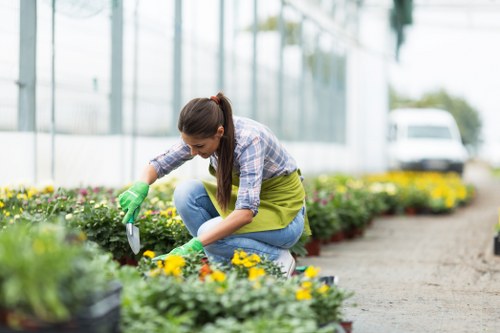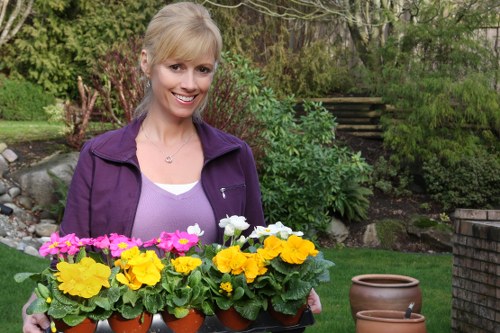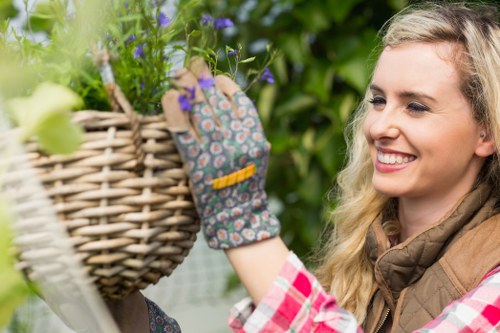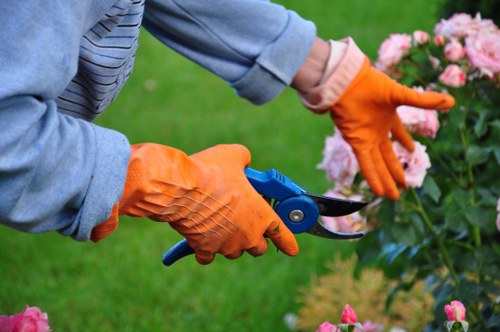Comprehensive Guide to Garden Maintenance in Beckenham

Introduction to Garden Maintenance
Maintaining a beautiful garden in Beckenham requires dedication, knowledge, and the right strategies. Whether you're a seasoned gardener or a novice, understanding the fundamentals of garden upkeep can transform your outdoor space into a vibrant and thriving oasis.
**Garden maintenance** encompasses a variety of tasks, from regular watering and pruning to seasonal planting and pest control. By implementing effective maintenance practices, you ensure that your garden remains healthy, aesthetically pleasing, and environmentally sustainable.
In this article, we'll explore the essential aspects of garden maintenance in Beckenham, offering tips and insights to help you achieve a lush and well-maintained garden all year round.

Understanding Beckenham's Climate and Soil
Beckenham's Climate Overview
Beckenham enjoys a temperate maritime climate, characterized by mild summers, cool winters, and consistent rainfall throughout the year. This climate is conducive to a wide variety of plants, making it an ideal location for diverse garden types.
Impact of Climate on Garden Maintenance
The climate in Beckenham influences several maintenance activities. For instance, regular watering is essential during the summer months, while protecting plants from frost is crucial in winter. Understanding these seasonal variations allows gardeners to plan and execute maintenance tasks effectively.
Optimizing Garden Care for Local Conditions
To optimize garden care in Beckenham, select plants that thrive in the local climate and soil conditions. Incorporate native species that are well-adapted to the environment, reducing the need for excessive watering and protection against pests.

Essential Garden Maintenance Tasks
Regular Watering Practices
Consistent watering is the cornerstone of healthy gardens. In Beckenham, it's advisable to water early in the morning to reduce evaporation and fungal growth. Implementing drip irrigation systems can enhance water efficiency and ensure plants receive adequate moisture.
Pruning and Trimming
Pruning helps maintain plant shape, encourages new growth, and removes dead or diseased branches. Regular trimming of hedges and shrubs promotes a tidy appearance and prevents overcrowding, which can hinder plant health.
Weed Control
Weeds compete with your plants for nutrients, water, and sunlight. Effective weed control involves regular weeding, mulching, and the use of organic or chemical herbicides when necessary. Maintaining a weed-free garden ensures that your plants can thrive without unnecessary competition.

Seasonal Maintenance Tips
Spring Gardening
Spring is the perfect time to prepare your garden for the growing season. Begin by clearing any debris, planting new flowers and vegetables, and applying compost to enrich the soil. Early spring is also an ideal time for pest control, preventing infestations before they escalate.
Summer Care
During the summer months, focus on maintaining adequate moisture levels, providing shade for sensitive plants, and managing pests and diseases. Regularly monitor your garden for signs of stress and take prompt action to address any issues.
Autumn Preparation
As the growing season winds down, autumn is the time to plant bulbs for the following year, rake fallen leaves, and prepare your garden for the winter months. Protect perennials and tender plants by adding mulch and covering vulnerable areas to shield them from harsh weather conditions.

Choosing the Right Plants for Beckenham Gardens
Native Plants
Opting for native plants ensures that your garden is well-suited to the local environment, requiring less maintenance and resources. Native species are more resistant to local pests and diseases, promoting a healthier and more sustainable garden.
Perennials vs. Annuals
Perennials offer long-term benefits, returning year after year with minimal effort. Annuals, on the other hand, provide vibrant colors and diversity but require replanting each season. A balanced mix of both can enhance the visual appeal and resilience of your garden.
Drought-Tolerant Varieties
Incorporating drought-tolerant plants can reduce water usage and ensure your garden remains lush even during dry spells. Species such as lavender, sedum, and ornamental grasses are excellent choices for low-water landscapes.

Pest and Disease Management
Identifying Common Pests
Beckenham gardens can be home to a variety of pests, including aphids, slugs, and caterpillars. Early identification and management are crucial to prevent widespread damage. Regularly inspect your plants for signs of infestation and take appropriate measures to control pest populations.
Organic Pest Control Methods
Using organic methods, such as introducing beneficial insects like ladybugs and using neem oil, can effectively manage pests without harming the environment. These approaches promote a balanced ecosystem within your garden.
Preventative Measures
Implementing preventative measures, such as proper sanitation, crop rotation, and using insect-repellent plants, can significantly reduce the risk of pest and disease outbreaks. Maintaining overall plant health also enhances resilience against potential threats.

Soil Health and Fertilization
Testing and Amending Soil
Healthy soil is the foundation of a thriving garden. Conduct regular soil tests to determine nutrient levels and pH balance. Based on the results, amend the soil with organic matter, such as compost or well-rotted manure, to improve fertility and structure.
Organic vs. Synthetic Fertilizers
Choosing between organic and synthetic fertilizers depends on your gardening philosophy and specific plant needs. Organic fertilizers enhance soil health and promote sustainable growth, while synthetic options provide targeted nutrient boosts for rapid results.
Fertilization Schedule
Establishing a fertilization schedule ensures that your plants receive the necessary nutrients at the right times. Typically, fertilizing in early spring, mid-summer, and late autumn aligns with the growth cycles of most garden plants.

Irrigation Systems for Efficient Water Use
Types of Irrigation Systems
Installing an efficient irrigation system can save time and conserve water. Common options include drip irrigation, soaker hoses, and sprinkler systems. Each type has its advantages, depending on the layout and specific needs of your garden.
Drip Irrigation Benefits
Drip irrigation delivers water directly to the plant roots, minimizing evaporation and runoff. This method is highly efficient, especially for gardens with defined planting beds and individual plantings.
Automating Your Watering Routine
Automating your irrigation system with timers and sensors can further enhance water efficiency. Automated systems ensure consistent watering schedules, reducing the risk of over or under-watering and freeing up your time for other maintenance tasks.

Lawn Care and Maintenance
Mowing Techniques
Proper mowing techniques are essential for maintaining a healthy lawn. Set your mower blades to the appropriate height, avoiding cutting more than one-third of the grass blade at a time. This practice encourages deeper root growth and a denser turf.
Fertilizing Your Lawn
Regular fertilization provides the nutrients necessary for a lush and resilient lawn. Choose a fertilizer that matches your grass type and apply it during the growing season to support optimal growth and color.
Weed and Thatch Management
Controlling weeds and thatch buildup is vital for lawn health. Implementing practices like aeration, dethatching, and applying pre-emergent herbicides can prevent weed infestations and maintain a smooth, green lawn.

Hardscaping and Garden Structures
Pathways and Patios
Incorporating hardscaping elements like pathways and patios enhances the functionality and aesthetics of your garden. Choose materials that complement your garden's style and ensure they are properly maintained to withstand Beckenham's weather conditions.
Garden Fencing and Borders
Fencing and borders not only define garden spaces but also contribute to the overall design. Select durable materials and styles that align with your garden's theme, providing structure and visual interest.
Outdoor Furniture and Accessories
Adding outdoor furniture and accessories creates inviting spaces for relaxation and entertainment. Regularly clean and maintain these elements to keep them looking their best and ensure longevity.

Seasonal Planting and Flower Selection
Choosing the Right Flowers
Selecting flowers that bloom in different seasons ensures continuous color and vibrancy in your garden. Consider a mix of perennials, annuals, and bulbs to achieve a diverse and resilient floral display.
Planting Schedules
Adhering to planting schedules based on season and plant type maximizes growth and blooming potential. Spring and autumn are ideal times for planting most flowers, allowing them to establish roots before extreme weather conditions.
Companion Planting
Companion planting involves growing compatible plants together to enhance growth, repel pests, and improve overall garden health. Research plant pairings that benefit each other and integrate them into your garden design.

Mulching for Garden Health
Benefits of Mulching
Mulching plays a crucial role in garden maintenance by conserving moisture, regulating soil temperature, and suppressing weed growth. It also adds a finished look to your garden beds, enhancing their appearance.
Types of Mulch
There are various types of mulch available, including organic options like bark, straw, and compost, as well as inorganic options like gravel and rubber. Choose the type that best suits your garden's needs and aesthetic preferences.
Applying Mulch Correctly
Proper mulch application involves spreading a layer 2-3 inches thick around plants, avoiding direct contact with stems and trunks to prevent rot and disease. Replenish mulch as needed to maintain its effectiveness.

Sustainable Gardening Practices
Composting
Composting transforms organic waste into nutrient-rich fertilizer, promoting sustainable gardening practices. Set up a compost bin and regularly add kitchen scraps, garden trimmings, and other biodegradable materials to create a valuable soil amendment.
Water Conservation Techniques
Implementing water conservation techniques, such as rainwater harvesting and using mulch, reduces water usage and supports a sustainable garden. These practices not only benefit the environment but also lower your gardening costs.
Eco-Friendly Pest Control
Adopting eco-friendly pest control methods minimizes the impact on beneficial insects and the broader ecosystem. Techniques like using neem oil, introducing natural predators, and planting pest-resistant varieties contribute to a healthier garden environment.

Maintaining Garden Tools and Equipment
Tool Maintenance Tips
Proper maintenance of garden tools ensures their longevity and effectiveness. Regularly clean, sharpen, and oil your tools to keep them in optimal condition. Storing them in a dry place prevents rust and damage.
Seasonal Equipment Care
Different seasons require specific care for garden equipment. For example, winter storage involves cleaning and protecting tools from moisture, while spring preparation focuses on sharpening and readying tools for the upcoming gardening season.
Investing in Quality Tools
Investing in high-quality garden tools may involve a higher upfront cost but offers long-term benefits through durability and performance. Quality tools make maintenance tasks easier and more efficient, enhancing your overall gardening experience.

Creating a Maintenance Schedule
Monthly Maintenance Checklist
Establishing a monthly maintenance checklist ensures that all essential tasks are completed in a timely manner. This organized approach helps prevent oversight and promotes consistent garden health.
Tracking Seasonal Tasks
Tracking seasonal tasks provides a clear roadmap for garden maintenance throughout the year. Use calendars or digital tools to schedule activities like planting, pruning, and fertilizing, aligning them with the appropriate seasons.
Adapting to Changing Conditions
Be prepared to adapt your maintenance schedule based on weather patterns and unexpected garden challenges. Flexibility allows you to address issues promptly and maintain the overall health and beauty of your garden.

Hiring Professional Garden Maintenance Services
Benefits of Professional Services
Hiring professional garden maintenance services in Beckenham offers numerous benefits, including expertise, time savings, and access to specialized equipment. Professionals can tailor maintenance plans to your garden's unique needs, ensuring optimal results.
Choosing the Right Service Provider
Selecting the right garden maintenance service involves researching local providers, checking reviews, and assessing their range of services. Ensure that the company you choose aligns with your maintenance goals and budget.
Customizing Maintenance Plans
Customized maintenance plans address the specific requirements of your garden, whether it's regular mowing, seasonal planting, or specialized pruning. Working closely with professionals allows you to achieve the desired outcome with minimal effort.

Conclusion
Effective garden maintenance in Beckenham hinges on understanding local climate conditions, selecting appropriate plants, and implementing consistent care routines. By following the guidelines and tips outlined in this article, you can cultivate a thriving garden that enhances your home's beauty and provides a peaceful retreat.
Whether you choose to maintain your garden independently or enlist professional services, prioritizing regular maintenance tasks will ensure that your garden remains healthy, vibrant, and enjoyable throughout the year.
Ready to transform your garden? Contact us today to explore our professional garden maintenance services and start your journey towards a stunning outdoor space.